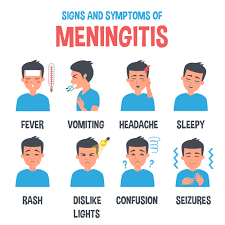Listeria Monocytogenes and Meningitis spread through food
Listeria monocytogenes is a foodborne pathogen that can cause meningitis. The Dutch University Hospital in Amsterdam, AMC investigated listerial genetic variation and the relation with clinical outcome in meningitis. The main conclusion of the research is that the use of disinfectants in the food industry may cause meningitis that is less treatable. Research by the AMC shows that patients with meningitis by Listeria often die or have serious sequelae. The research is published this week online in the journal Clinical Microbiology and Infection.

Can Meningitis spread through food become a problem
The AMC researchers noticed that patients lately cure lesser of meningitis caused by Listeria. A good explanation was not available. It is known that Listeria is transmitted through food. It can cause food infection and in rare cases meningitis. After a long search and DNA analysis it was shown that listeria increasingly becomes insensitive for the disinfectant benzalkonium chloride, which is widely used in the food industry. The researchers found this out to their big surprise. According to researcher professor Diederik van de Beek of the AMC, it is a disinfectant which is used to clean equipment and which is added in the food in order to guarantee the quality of the product. ‘That in itself is nice, but our analysis show that there is a downside to this. The problem is that the bacteria has become resistant to the disinfectant, and becomes less susceptible to antibiotics with which we treat meningitis’. The AMC has the conclusions on data of 98 patients with meningitis cause by the Listeria bacteria. It is becoming increasingly more difficult to treat this group of patients adequately in recent years. Prof Van de Beek estimates that formerly 30% of patients do not recover from the disease or dies. ‘That has now risen to just over 70%. Fortunately this disease is not very common, but it is worrisome’.
Alternatives
There are plenty of alternatives to benzalkonium chloride (also referred to as quaternary ammonium) for disinfection purposes. For example ethanol, which is a disinfectant used extensively in the food industry. Unfortunately there are still many companies who only use one type of disinfectant. It is very important to regularly change the disinfectant. Another possibility to alternative Virkon. Our experience with Virkon is that it dries more slowly, allowing more time to dry the surface before production can be started. Probably this is one of the reasons why so many food companies do not switch to another disinfectant. This study shows that more attention is needed. As a food additive, benzalkonium chloride could be replaced by sorbic acid, benzoic acid, nitrite or natamycin.
Maybe you are also interested in :
The 5 Most Common Places Where to Look for Listeria Monocytogenes
